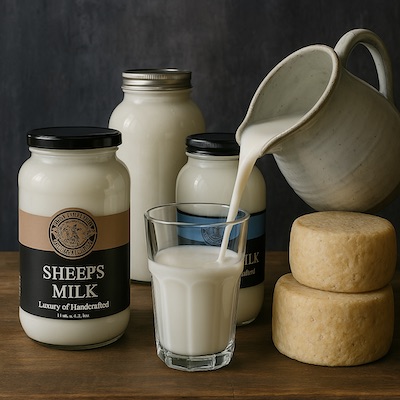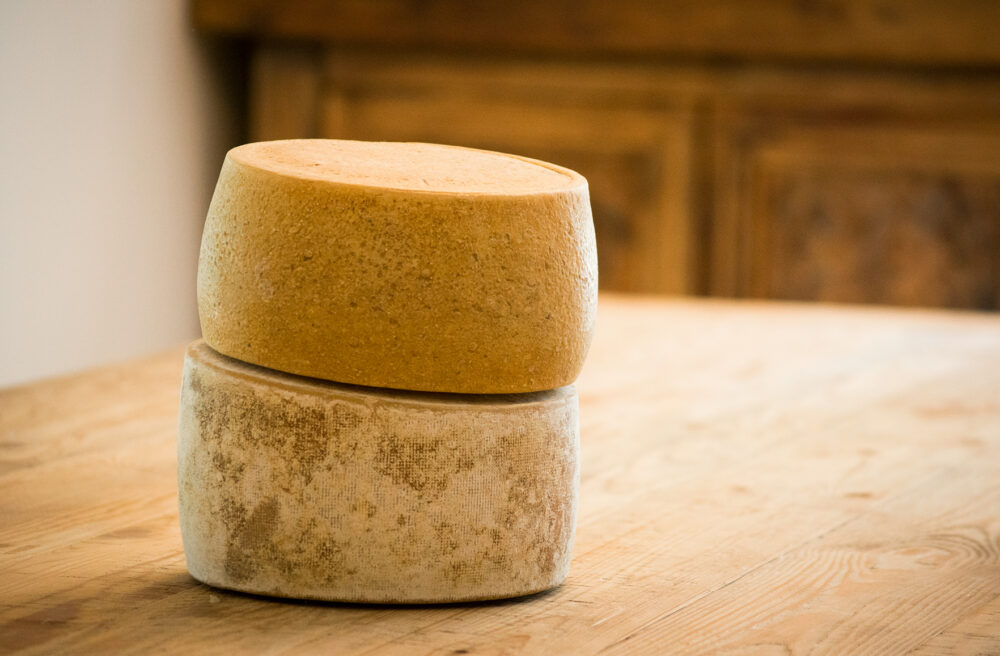Eggs have long held the crown as the “perfect protein.” But science and tradition now show us other foods — often overlooked — can pack even more. And here’s the surprising twist: they’re not meat. They are dairy products made with sheep’s milk.
At Secret Lands Farm, sheep quietly graze in Ontario’s Grey Highlands, producing milk and bones that rival eggs in protein power. From cottage cheese to bone broth, here are five everyday foods delivering a bigger punch than you think.
East Frisian sheep’s breed gives us incredibly rich milk – full of protein, healthy fats, and minerals – that many people find easier on the belly than cow’s milk. In fact, sheep’s milk naturally contains only A2-casein (the gentler protein found in human, sheep and goat milk) and tiny fat globules, so it often digests more smoothly.
A New Zealand trial found that people drinking A2-only milk (like sheep’s) reported far less bloating and stomach upset than with ordinary cow’s milk. In another study, dairy-sensitive women had no more GI symptoms after sheep’s milk than cow’s. Yet, their breath tests showed significantly lower hydrogen levels (a lactose digestion marker) with sheep’s milk. In short, if you or someone you love balks at ordinary milk, our sheep’s milk products could be a game changer.
Over the past 10 years, we’ve turned our creamery into a hive of activity, making five signature sheep-based foods. As a team, we’re proud of how each one stacks up on protein – even more per 100 g than an egg (about 12.6 g). They’re also packed with the good stuff eggs don’t have: sheep’s milk naturally A2 protein, probiotics, and collagen. Read on to see the protein content of each, and why we think you’ll love them:
| Food (per 100 g) | Protein (g) |
| Chicken egg | 12.6 (for reference) |
| Sheep’s milk cottage cheese | 15.4 |
| Sheep’s milk Greek-style yogurt | ~8–12 |
| Aged sheep’s cheeses (Pecorino, Caciotta) | ~20–22 |
| Sheep’s milk kefir | ~6–16 |
| Lamb bone broth (with quinoa)** | ~10 |
| Quinoa (cooked) | 4.4 |
1. Sheep’s Milk Cottage Cheese – Creamy Protein Power
Made from whole, grass-fed sheep’s milk, our cottage cheese is a creamy delight. At about 15–16 g protein per 100 g, it beats an egg by a comfortable margin. (By comparison, standard cow’s cottage cheese is usually around 5–10 g). We make it in small batches so it stays silky and rich. Its mild, tangy flavor is ideal on toast or mixed into breakfast bowls. You’ll also notice it’s softer on the stomach – sheep’s milk naturally has A2 beta-casein and tiny fat globules, so it forms a gentler curd that digests faster than cow’s milk. This means the protein and fats go to work fueling your energy and muscle recovery, without that heavy feeling some people get from other dairy.
(Try it: Stir into savory porridge with herbs, or eat it on rye bread with smoked salmon – anywhere you’d use ricotta or cottage cheese.)
2. Sheep’s Milk Yogurt – Probiotic Boost
Our plain yogurt is made by fermenting sheep’s milk with active cultures. Yogurt naturally concentrates protein, and sheep’s milk starts higher, so our Greek-style version has about 8–12 g protein per 100 g (thicker than most regular yogurts). It also delivers probiotics for your gut. Like the cheese, it’s A2-only and gently fermented, so many customers with lactose sensitivity find they can enjoy yogurt even if milk upsets them. The tangy yoghurt is wonderfully versatile – we love it spooned over berries or blended into smoothies for extra creaminess and tartness.
Recipe idea: Kefir Pancakes! You can even swap our kefir (see below) into pancake or waffle batter in place of buttermilk. Here’s a quick version:
- Mix batter: Whisk 1 cup sheep kefir, 2 eggs, 2 tbsp melted butter and a dash of vanilla. In another bowl stir 1 cup whole-wheat flour, 1 tbsp baking powder, 1/2 tsp salt. Combine until just mixed (don’t overmix).
- Cook: Pour batter onto a hot, greased skillet. Flip when bubbles form and bottoms are golden (about 2–3 minutes each side).
- Serve: Stack them up with fresh fruit or a drizzle of maple syrup. These pancakes carry extra probiotics and protein from the kefir, and the mild tang keeps the flavor bright.
3. Aged Sheep Cheeses – Sharp Protein Punch
When milk is aged into cheese, its nutrients concentrate. Our wheels of Pecorino and Caciotta are particularly protein-dense – roughly 20–22 g per 100 g. These cheeses are firm and savory, perfect on a charcuterie board or grated over pasta and salads. They’re also 100% sheep’s milk, so they retain that A2-casein benefit; many fans who can’t tolerate cow’s cheese happily snack on ours. Plus, like all sheep dairy, they’re rich in calcium and vitamins A and D. Read more about the history of pecorino being the ultimate food for Rom legionnaires here.
(Pro tip: shave Caciotta into a Caesar salad, or crumble Pecorino over roasted veggies – the salty, nutty flavor makes any dish “pop”.)
4. Sheep’s Milk Kefir – Tart and Tangy Wellness
Kefir is yogurt’s bubbly cousin – a fermented drink made by adding kefir grains to milk. Our sheep’s milk kefir tastes refreshingly tart. It packs probiotics (friendly bacteria) to help your digestion, plus more protein than you might expect. A one-cup serving of sheep kefir typically has about 6–16 g protein, depending on how many milk solids remain. It’s A2 protein again, with no added thickeners – just pure milk and live cultures. We cherish kefir as a kitchen helper: it makes creamy smoothies, overnight oats and even tenderizes meat. Read more about its probiotics’ qualities here.
Recipe idea: Creamy Kefir Salad Dressing: Whisk together ½ cup sheep kefir, avocado, 2 tbsp olive oil, 1 tbsp lemon juice, 1 tsp minced garlic and herbs (like dill or parsley), and a pinch of salt and pepper. Taste and adjust lemon or seasoning as you like. Drizzle over crisp greens or cucumber tomato salads. The probiotics and calcium in kefir give this dressing a silky tang that beats mayo or store-bought yogurt dressings.
5. Lamb Bone Broth (with Quinoa) – Collagen & Complete Protein
Finally, we slow-simmer our lamb bones into a rich bone broth. Broths are not usually counted as high in protein per 100 g – ours is about 10 g on its own – but they’re a unique protein source and are loaded with collagen. When you cook bones, the collagen (a structural protein in joints and skin) breaks down into gelatin, releasing amino acids like glycine and proline. These nutrients can help maintain joint flexibility and even soothe the gut lining. We serve our lamb broth as soup or use it to make stews; for extra protein, we add quinoa, a gluten-free grain. Quinoa itself offers about 4.4 g of protein per 100 g cooked, and it contains all nine essential amino acids. The result is a hearty, savory soup where each spoonful provides collagen plus plant and animal protein.
Bone broth is also remarkably gentle on digestion. You can read the whole article about this fantastic product here. Our customers with tummy troubles find it soothing – likely because gelatin helps protect the stomach lining and reduces inflammation. So while eggs have no collagen or prebiotics at all, our broth-and-quinoa combo delivers both (plus a savoury warmth perfect for cold days).
A2 Milk, Lactose, and Digestive Ease
A common theme across all our products is digestibility. As noted, sheep’s milk contains only A2-casein. Unlike A1-casein (the standard type in most cow’s milk), A2 does not release the BCM-7 peptide in your gut. BCM-7 can trigger symptoms like gas and bloating in sensitive people. This means that even though all our dairy products contain lactose, they often cause less upset to people than ordinary dairy. In practical terms, if you or your kids get gassy or bloated from milk or cheese, trying sheep’s milk can be a “massive relief.” Many of our customers can’t tolerate cow or goat milk but thrive on ours.
On top of that, fermented items (yogurt, kefir) contain live cultures that help digest the milk sugars. And the bone broth’s gelatin is literally “pre-digested” collagen, which is easy on the stomach. All together, our high-protein line is a friendly alternative for anyone who finds eggs or cow’s dairy a bit heavy.
Why Sheep? And Delivery to Your Doorstep
So why did Secret Lands Farm go all-in on sheep? Quite simply, sheep offered something special: nutrient-rich milk, smaller herds to manage, and a natural niche in the Ontario culinary scene. Our East Friesians give much more milk per animal than other sheep breeds, and their milk’s unique profile (high protein, A2 casein, vitamins) won us over.
Raising sheep also lets us diversify: today, our farm box can include yogurts and cheeses, lamb chops, sausages, and broths. Sheep are part of our land’s balance, grazing paddocks and cycling nutrients. And importantly for you, it means we can offer delivery across Canada. That’s right – every Monday we ship chilled boxes of our dairy and lamb products from Ontario to doorsteps as far west as Vancouver and north to the territories. From our fields (and creamery) to your home table, we want to make these wholesome foods accessible to everyone who cares about real, protein-rich eating.
We hope this gives you a good understanding of why we love sheep and their products. They’ve changed our life – and we think they can change your pantry, too. Thank you for reading our story.
We look forward to serving you the best of Secret Lands in every delivery.
Warmly,
The Secret Lands Farm Team




